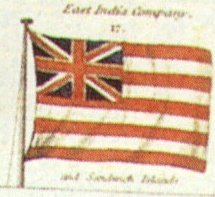| English: British East India Company flag. Image from flag chart by R.H. Laurie, 1842. (Photo credit: Wikipedia) |
At an event organised in connection with the Madras Week celebrations in the city recently, Stephan Roman, British Council regional director of South Asia, elucidated the repercussions of the Tanjore Invasion by the East India company. The incident, he said, stirred the then London and colonial United States. "In fact it might have been one of the influences for American Revolution, which began with the Boston Tea Party, a few months after the invasion,"he said.
Roman said that the then Nawab of Arcot along with the East India Company invaded the kingdom of Thanjavur in 1773 . The roots of this event lay in Nawab's dependence on the company for securing protection for his kingdom and fortification of his principalities, he added.
Further, he explained that, after funding a number of wars by the East India Company and indebted by the heavy maintenance cost of the British troops in his territory, the Nawab began to borrow money. Money was borrowed at huge interest rates from some of the British merchants and a number of Councillors of East India Company. There was a growing debt coupled with corruption among his own revenue officials, said Roman.
An opportunity soon presented itself when the ruler of Tanjore attacked a small kingdom that belonged to the Nawab of Arcot. The Nawab was instigated by the councillors of the East India Company and British Merchants, led by Paul Benfield, to invade Tanjore.
The truth about the invasion soon reached London and the British Parliament. "It was the most debated topic of the day. The stuff which, if happened today, would be all over CNN, BBC and all newspapers. From coffee shops to families' parties, the event was discussed and debated everywhere," said Roman.
In the British Parliament, the criticism of the move was led by Edmund Burke, who took to harsh attacks on Benfield and the councillors. He argued how could people who have been in India for only a few years amass such wealth. This would put rulers of huge kingdoms under their debt.
The move also crossed the seas and reached America which was then a colony of East India Company. "The Americans identified with the Indians. When they saw the arbitrary overthrow of kings of the land by the East India Company, it gave rise to the fear that the same might happen to them. There were broadsheets circulated that spread the news of the invasion of Tanjore and the conduct of the company. Within a few months there was the Boston Tea Party which soon led to the American revolution," he said. {Read on}


